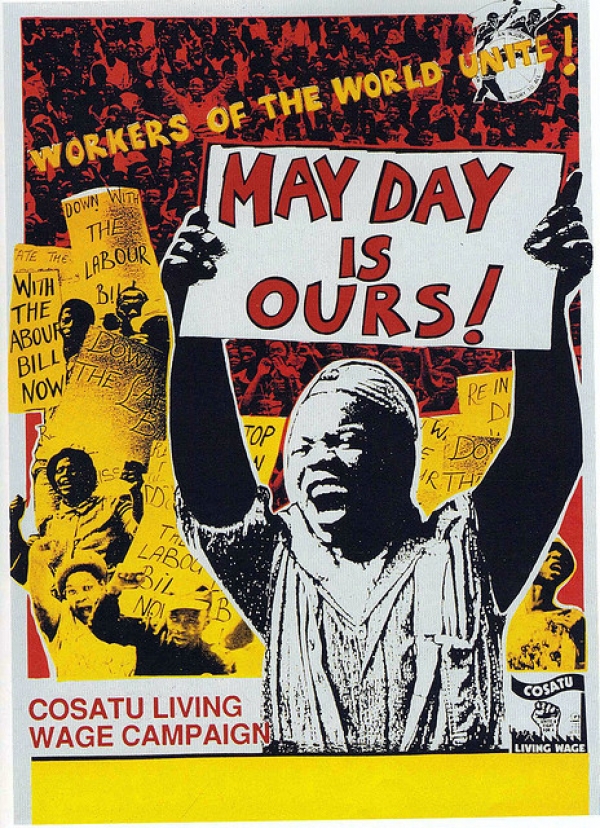

COSATU’s May Day poster in 1989. Image taken from the Flickr account of user Egui_ (CC BY-NC 2.0).
29 April 2015
On Friday 1 May South Africa will celebrate Workers’ Day. In the first of three articles on the current state of the labour movement, Leonard Gentle explains the history of this holiday.
May Day was an old Northern hemisphere festival celebrating the beginning of Spring – with all its connotations of a new life and the end of the cold dark winter. Of course it was the poor, the labouring classes, the peasants who most felt the change from winter to spring as they didn’t have mansions and castles to keep them warm during winter. And the beginning of spring also meant the beginning of sowing new crops for their livelihoods later.
But May Day became a political struggle of the working class when in 1886 workers marched in Chicago in the USA to Haymarket Square demanding a reduction of working time to eight hours.
When a bomb was thrown at the police they began to shoot at the crowd of workers, killing many. And after the Haymarket massacre the police blamed anarchist agitators for the bomb and arrested them and then, subsequently, hanged them.
This will resonate with our experience at Marikana in 2012, when police gunned down workers, then arrested survivors and accused them of murder, and then the workers’ call for R12,500 became rallying slogan for other struggles.
The slogan of the May Day workers was “8 hour work, 8 hour rest and 8 hour play” – a vision that went way beyond the notion of “trade union demands” - and struck at the heart of the capitalist system of exploitation – across the spheres of production and reproduction – and the notion that the working class only exists to be exploited and not to have “play” – pleasure, love, and ultimately, political power.
It was in broader understanding of this that the First International – a forum of Left parties, trade unions, workers clubs and societies, grouped around the idea of socialism, decided to proclaim 1 May as International Workers’ Day.
In the US, the state followed the Haymarket massacre and the killing of the 4 activists, by refusing to grant an eight-hour working day. From the 1920s May 1 was declared America Day, then War Day (in celebration of the World War 1 victory) and even Patriots’ Day after World War 2.
Meanwhile, as a sop to the trade unions, a day was chosen in August for a holiday and called Labor Day – which is still the case in the USA today.
In South Africa of course 1 May is not the beginning of spring but marks the shift towards winter – so there is no natural sense of optimism associated with that day. Nevertheless the impact of the international socialist movement and the demands associated with May Day led to trade unions in SA and the early Communist Party of SA celebrating May Day from 1919 onwards. But these were initiatives of whites, and in the minds of these organisations only whites were workers and black people were simply either Chiefs or uncivilised Natives.
It took the rise of black movements of workers and peasants like the ICU to impact on political life and force changes to the thinking of some trade unionists and CPSA individuals to make them begin to organise multi-racial trade unions in the 1930s and to have May Day have the beginnings of a meaning for the black majority of the working class.
When COSATU was launched as a radical movement in 1985 it embraced May Day. So the Apartheid regime of P.W. Botha did the same trick as the US government – tried to subvert the revolutionary nature of May Day and the revolutionary possibilities of trade unions by having an “official” state-recognised Workers’ Day at another time and not on May Day. So COSATU decided to fight to have May Day a public holiday, and on 1 May.
Ever since we have had two competing visions of May Day and of the working class and trade unions. One is about May Day being about “labour issues” and trade unions as just another interest group in society, and the other is about radical transformation for society as a whole.
Gentle is director of the International Labour Research and Information Group (Ilrig). Views expressed in this article are not necessarily those of GroundUp.